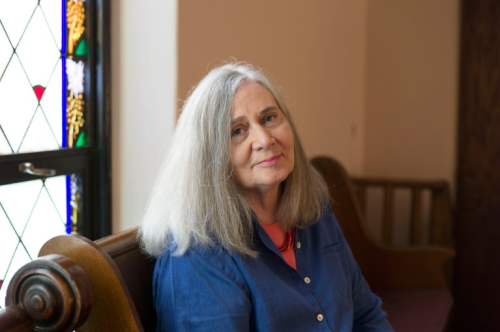Bartleby
Moderator

Marilynne Robinson (born 26 November 1943, in Sandpoint, Idaho) is an American novelist and essayist.
Raised as a Presbyterian, she later became a Congregationalist, worshipping and occasionally preaching at the Congregational United Church of Christ in Iowa City. She describes her religious view as a liberal Democrat, stating "I wrote about the speech John Winthrop gave on the Arabella, about what the city on the hill should be, and in that speech, the world liberal is used over and over and over again, and it means ‘openhanded.’ As it does also in English translations of the Bible. As a kind of politics, that’s what I mean by liberal."
Acquainted with books since childhood, having read Moby Dick at age nine, a favourite book of hers then, she soon grew an erudite mind. Among the writers she went on to study, one of them being Shakespeare, of which she wrote a doctorate dissertation on Henry IV, Part II, Robinson got enchanted by John Calvin, a figure she addresses in her essays and novels, in an attempt to rehabilitate his image as a liberal-minded democrat and a brilliant reformer, someone who views "that the aesthetic is the signature of the divine. If someone in some sense lives a life that we can perceive as beautiful in its own way, that is something that suggests grace, even if by a strict moral standard ... they might seem to fail." Along with Calvin, Robinson has been preoccupied with the idea that blind consensus, combined with a cynical thinking of History, has dampened reason, and she has tried to bring back to life issues such as the importance of the 19th Century abolitionist movement's religious and social impact on the American Middle West; the belief that science and religion inform each other; among other ideas. She has constantly defended in her essays the need to go back to fundamental texts that formed American thought and culture (instead of only assuming the content of them) in order to get to their truth — an opinion particularly visible in McGuffey and the Abolitionists, to be found in her first book of essays. As she writes in the introduction to her collection The Death of Adam: “we are so persuaded of the rightness of our judgment as to invalidate evidence that does not confirm us in it. Nothing that deserves to be called truth could be arrived at by such means.”
A respected academic throughout her life, she has been writer-in-residence or visiting professor in many universities, teaching literature and writing for most of her life at the University of Iowa in its graduate program.
Critically acclaimed from the publication of her first novel Housekeeping (called a "haunting, poetic story, drowned in water and light, about three generations of women." by The Guardian), her fiction is marked by lyrical, elegant, carefully composed sentences, in which she demonstrates the manifestations of faith, grace, compassion, and forgiveness in daily life; the contradictions and beauties of every human being; the ideological developments in the history of the United States of America, among other notions. Her series of novels set in or related to fictional town Gilead, composed of Gilead (winner of the Pulizer Prize for Fiction), Home (winner of the Orance Prize for Fiction), Lila (winner of the National Book Critics Circle Award), and Jack have been compared to "Gospels, telling the same story four different ways." by The New Yorker. About the interplay between religion and fiction, she remarked: "Religion, if it is genuine, is so profoundly interwoven with individual thought and experience that it is no more exhaustible than consciousness itself. And fiction whose purpose is didactic is bad no matter whether the matter to be “taught” is Christianity or the world view of Ayn Rand."
Above all, as expressed in her essay The Sacred, the Human, she believes in the capability of humans to be good: “Let us face the truth, that human beings are astonishing creatures, each life so singular in its composition and so deeply akin to others that they are inexhaustibly the subject of every art.”
Bibliography
Fiction
- Housekeeping (1980)
- Gilead (2004)
- Home (2008)
- Lila (2014)
- Jack (2020)
- Mother Country: Britain, the Welfare State, and Nuclear Pollution (1989)
- The Death of Adam: Essays on Modern Thought (1998)
- Absence of Mind: The Dispelling of Inwardness from the Modern Myth of the Self (2010)
- When I Was a Child I Read Books (2012)
- The Givenness of Things: Essays (2015)
- What Are We Doing Here?: Essays (2018)
Related Threads
Related Links
Marilynne Robinson, The Art of Fiction No. 198
Marilynne Robinson’s Essential American Stories
The Revelations of Marilynne Robinson
Marilynne Robinson, God and Calvin
Marilynne Robinson: The Novelist as Theologian
Saving Calvin from Clichés
Marilynne Robinson on What It Means to Be a Christian in Trump's America
Last edited:
